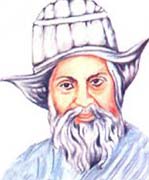Khawaja Ghulam Farid was born in 1845 in Chachran Sharif, Punjab. He was orphaned at 12 years old after the death of his father; his mother had died when he was 5, and was then brought up and educated by his elder brother. He was a scholar for the times and learned Arabic, Persian, Urdu, Sindhi, Braj, Bhasha and Saraiki. He also wrote many books and traveled to different cities to speak about Islam and peace. One significant belief he is known for his is opposition of British rule, he is remembered by his statement, “You rule yourself on your state and finish police station of British from your state.” He died in Chachran Sharif in 1901.
Teachings:
His work incorporates many ideas of Islam and is full of devotion for God as well as awareness of the message of prophets. He also elaborates on life, nature and humanity. He was a religious man and believed strongly in the awareness of higher power as well as the messages of Islam. He often preached the values of Islam and used his devotion to prophets in his works.
Influence and Work:
His work greatly influenced Pakistanis at the time and today. His strong Islamic values appealed to many and strengthened their support for his teachings and writings. Today many monuments have been created in his honor, especially in Pakistan. He has written countless books and works of poetry. He is known most commonly as an Urdu poet, but has written in Saraiki, Persian, and Sindi. Some of his works include:
Dewan-e-Farid in 1882. (Seraiki Poetry)
Dewan-e-Farid in 1884. (Urdu Poetry)
Manaqabe Mehboobia (in Persian prose)
Fawaid Faridia (in Persian prose)
His work has made such an impact on the lives of people that a study named Faridiat has come about in which people praise and learn about his life, teachings, and poetry.

0 Comments
Leave A Comment